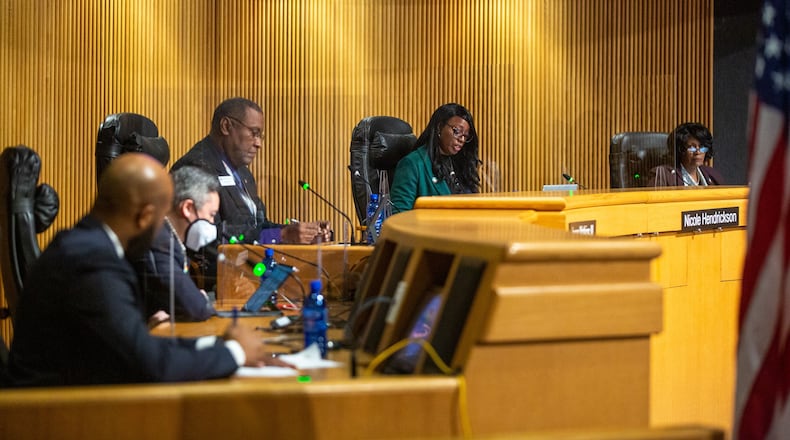A state legislator wants to nearly double the number of members on Gwinnett County’s Board of Commissioners and have members of the county’s Board of Education run in nonpartisan elections.
State Sen. Clint Dixon, R-Gwinnett, introduced two bills during the state Legislature’s special session on Tuesday that would dramatically alter the structure of the local boards, according to documents filed in the state Senate.
If the changes are approved, voters in Gwinnett County would elect one chairperson and nine county commissioners. Currently, the county has four commissioners. There would still be five school board members, but election districts would change.
As drafted, the bills would result in voters electing five additional commissioners in 2022 when they elect two existing commission seats. Voters would then cast ballots for the other two existing commission seats and chair of the county commission in 2024.
The legislation also calls for the chairperson of the county commission to only cast votes to break ties. The chair — now held by Nicole Love Hendrickson, a Democrat and the first Black woman to hold the seat — currently votes alongside commissioners on the majority of agenda items.
“Although Senator Dixon’s current proposal is part of a process to ensure due diligence, if enacted it will also ensure government operations would be drastically interrupted,” said Hendrickson in a Tuesday statement. “This in turn, will ultimately adversely affect our residents.”
Credit: Eli H. Spencer Heyman
Credit: Eli H. Spencer Heyman
County officials and Democratic state legislators first heard about a proposed change to the Board of Commissioners by a vague notice placed in the Gwinnett Daily Post warning that legislation would be introduced to amend the act that created the county’s board.
State Rep. Sam Park, a Democratic legislator who chairs the Gwinnett House Delegation, sent out an email to his colleagues last Thursday inquiring about the notice. Dixon did not claim it by Monday morning and other Democrats were unsure of its purpose.
County Commissioner Kirkland Carden said he called, texted and emailed Republican members of the Gwinnett Delegation last week.
Radio silence.
Carden didn’t know any details of the legislation until he received a Monday night email with a proposed list of first bill reads for the state Senate. He said he’s disappointed with the lack of communication between Dixon and the Board of Commissioners.
“This is an approach taken by a small group of legislators in a backroom for a county of (nearly) 1 million people,” Carden said.
Dixon declined to comment on the level of communication between him and county officials. He said that adding more elected members to the board would allow Gwinnett County residents to have better representation by allowing members to drill down on more local issues.
“We’ve got four county commissioners currently that represent right at 239,000 people each,” Dixon said Tuesday. “If you compare that to some of the surrounding counties, it’s one of the smallest commission boards based off our population.”
Hendrickson disagrees. She said Gwinnett County successfully functions under its current format — which is similar to nearby Fulton and Cobb counties — even as the county continues to expand and grow.
The bill would require additional commissioners to be present to form a quorum, which would make it difficult for the board to make timely decisions, Carden said. He added that the bill would not only add add five seats but undermine and weaken the chairperson’s position.
“I think this is a poorly planned bill,” Carden said. “I don’t think they took in a lot of consideration as to the implementation in county government. If they did, it’s pretty clear to me their goal was to hurt the efficiency of county government in which we’re able to get together to do our job to serve the people.”
In regard to the education bill, Dixon said the board should be nonpartisan since “the education of our children is a nonpartisan issue,” adding that he’s a proponent of making sure critical race theory is not taught in Gwinnett’s schools.
“The board members should always prioritize Gwinnett County children over political parties,” Dixon said.
The bills were assigned Tuesday morning to the State and Local Governmental Operations Committee, where it would first be considered before it could go to the full Senate floor for a vote. Dixon said he’s garnered full support for the bills from Republican members of the state House.
The Gwinnett County Board of Education voted unanimously in October to work with the Legislative and Reapportionment Office to begin the process of redrawing election districts.
“We had no clue Sen. Dixon was planning this but will continue to work together as a Board to make sure our process is transparent and compliant,” said Everton Blair, chairperson of the Gwinnett County Board of Education, in a Tuesday text message.
Dixon stepped into the spotlight this year for backing the Buckhead cityhood movement. Elected in 2020, he serves as the floor leader for Gov. Brian Kemp.
State Sen. Lee Anderson, R-Grovetown, is also sponsoring the bills. He represents a district that currently runs from Columbia County up to Hart County, far from Gwinnett.
For the first time in nearly three decades, Democrats took control of the Gwinnett County Board of Commissioners in 2020. The new members took seats previously held by Republicans.
Democrats also lead the county’s school board, sheriff’s office and district attorney’s office. Dixon said partisan politics did not lead him to propose the bill, despite the influx of Democratic power in recent years.
The Gwinnett Delegation policy states that members seek “close cooperation and communication” with local governing bodies. It also requires a majority of Gwinnett legislators to sign legislation for it to pass.
Democratic state senators from the Gwinnett Delegation addressed their colleagues on Tuesday to say that the bills shouldn’t be taken up during the special session. Local legislation is only intended to be brought up during the session if there is an urgent need for it, said state Sen. Sally Harrell, D-Atlanta.
”These are things that our people in our local communities should be able to speak up for and weigh into through the normal legislative process,” Harrell said. “We shouldn’t be ramming this through with very little public scrutiny in passing it as part of a local consent calendar.”
About the Author
Keep Reading
The Latest
Featured





